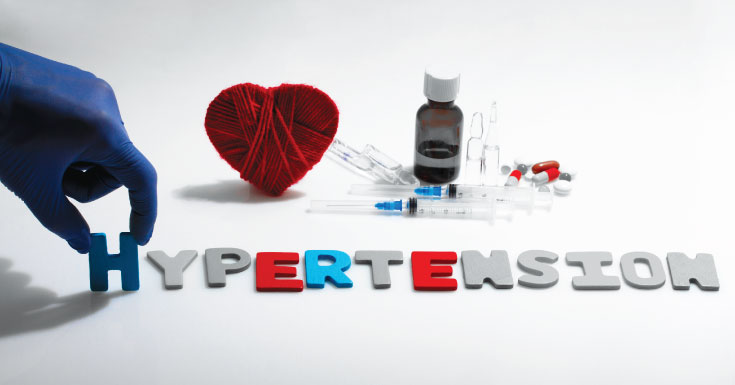Anyone can have hypertension – even if you generally feel well or do not experience any signs of illness. When symptoms do appear, it is usually severe and life-threatening – this is why hypertension is often considered a “silent killer”. In this article, let’s learn more about this deadly disease from Dr. Lim Kien Chien, Consultant Cardiologist & Internal Medicine at Pantai Hospital Ayer Keroh and how to manage it effectively.
Based on the National Morbidity Survey 2019, 3 in 10 Malaysian adults or 6.4 million Malaysians have hypertension. The risk increases with age and being overweight as well as having diabetes mellitus and a family history of high blood pressure. For women, there’s a higher chance of having high blood pressure after menopause.
What is hypertension or high blood pressure?
The World Health Organization (WHO) describes blood pressure as a force exerted by circulating blood against the walls of the body’s blood vessels or arteries. When blood pressure becomes higher than normal, it will result in hypertension. Untreated high blood pressure can lead to many health hazards, including stroke, kidney problems, heart attack, and heart failure.
According to Dr. Lim Kien Chien, Consultant Cardiologist & Internal Medicine at Pantai Hospital Ayer Keroh, blood pressure is important to deliver adequate blood supply to the major organs. “Blood pressure reading is divided into two types: systolic and diastolic blood pressure. Systolic pressure is the pressure generated while the heart contracts. On the other hand, diastolic pressure is the pressure on the blood vessel wall while the heart relaxes,” Dr. Lim explains. “Our normal BP range are: SBP 90 to 140mmHg, DBP 60-90mmHg. Hypertension occurs when there’s elevated blood pressure , systolic (S) BP = 140mmHg or more and/or diastolic (D) BP = 90mmHg or more. If your SBP exceeds 180mmHg or DBP is more than 100mmHg, it is a hypertension emergency! You should visit a hospital immediately.”
Identifying the main cause of hypertension
Dr. Lim further explains that a majority of patients with hypertension have no obvious causes – this type of high blood pressure is called essential hypertension.
Only 1 in 10 hypertensivon have identifiable causes (secondary hypertension), they are:
- hormone: excessive thyroid hormone or excessive stress hormone (adrenal hormone)
- kidney: polycystic kidney (bubbles in the kidney), renal artery stenosis (narrowing of kidney arteries), nephrotic/nephritic syndrome (abnormal protein leaks)
- heart: congenital narrowing of the big vessel (aorta)
- lungs: obstructive sleep apnea (poor sleep quality with inadequate oxygenation while sleeping)
- drugs: use of oral contraceptive pill (birth control pill), steroid drugs, stimulants (slimming pills), street drugs
- obesity: being overweight or obese
- women-related conditions: pre-eclampsia (pregnancy-induced hypertension) or eclampsia (more severe condition, sometimes with seizures), post-menopausal
“It’s important to identify the root cause of hypertension,” Dr. Lim says. “If we treat the direct cause, we can also potentially treat secondary hypertension successfully.
Symptoms of hypertension complications
Hypertension is dubbed “the silent killer” for a good reason. As it does not produce any obvious symptoms, most people would not know there’s something amiss with their blood pressure without checking it. When unusual conditions do arise, it usually points to complications resulting from hypertension.
“Generally, hypertension itself has no symptoms. If you notice any symptoms of hypertension, they are always a bad sign! This is because only complications of hypertension cause symptoms,” Dr. Lim says, adding that common complications from this disease can affect different organs:
- Brain: bleeding or blockage in the brain, resulting in a stroke, paralysis or coma.
- Heart: heart attack or heart failure – symptoms include breathlessness or chest pain, irregular heartbeat (atrial fibrillation) causing palpitation and risk of stroke.
- Kidney: kidney could potentially shut down (permanently or temporarily) – dialysis may be required
- Leg arteries: blockage causing pain in the thigh or calves while walking but relieved with rest
- Aorta: one of the most life-threatening complications is tearing of the big vessel or aortic dissection, which causes internal bleeding.
Women-specific blood pressure issues
There are no gender-specific complications of hypertension – both men and women are susceptible to hypertension. However, women would need to be cautious about high blood pressure during pregnancy, which can result in pre-eclampsia or eclampsia.
“Pre-eclampsia can affect 5 to 10% of pregnancies. The exact cause is unknown; some believe it is related to genetics. It is also more common during the first pregnancy. In addition, there is a high chance of recurrence if the patient has a previous history of pre-eclampsia,” Dr. Lim elaborates. “Pre-eclampsia will present with signs such as headache, blurring of vision, as well as protein leak in urine. A more severe form of this condition is eclampsia which may cause seizures.”
Pregnancy aside, post-menopausal women are also at a higher risk of this debilitating disease. Dr. Lim shares that it is not unusual to find 6 out of 10 women above 65 years diagnosed with hypertension. Estrogen and progesterone hormone, which play a role in protecting against heart diseases, decrease after menopause, thus increasing the chances of women getting heart attack and stroke at this stage of their lives.
Managing hypertension and preventing the disease
To date, there is no cure for high blood pressure, but it can be controlled. Well controlled hypertension lives as long as normal individuals.
However, this condition can be managed and prevented with healthy lifestyle habits. Here are a few suggestions from Dr. Lim:
- Prevention is better than cure, so go for regular health screenings, especially if you are over 40 or have other cardiovascular risk factors
- Diet and lifestyle: opt for a low salt diet, avoid MSG and reduce eating out
- Regular exercise: 30-minute workout at least five times a week is ideal
- Weight loss: aim to reduce 10% from your current weight – this has been clinically proven to help control blood pressure
These simple changes in your daily life can make a difference in helping you lower the risk of hypertension. For more severe cases, your doctor may prescribe medication.
Dr. Lim explains that there are five groups of high blood pressure medicine that work differently to bring down and control your blood pressure:
- ACE-inhibitor or ARB (Angiotensin Receptor Blocker): relaxes the kidney vessels
- Beta-Blocker: reduces heart rate and blood vessel tone
- Calcium Channel Blocker: relaxes the blood vessels
- Diuretic: removes excessive salts to support the kidney
Medicines that act on the brain: reduce blood pressure by blocking neurotransmitters in the brain)
Remember, regular check-ups and maintaining a healthy lifestyle and diet can go a long way to help you avoid the detrimental complications of hypertension. If you are not sure what to do, talk to your doctor to find out how you can keep this condition under control.
Patient File
A 35-year-old mother presented to Dr. Lim with blood pressure of 169/100 mmHg and a heart rate of 120 bpm. Upon further examination, she was thin and anxious. Examination showed prominent neck lump and hand tremors. The blood test confirmed thyrotoxicosis (excessive thyroid hormone). Diagnosis of hypertension and hyperthyroidism secondary to Grave’s disease was made. Dr. Lim prescribed medications to help her control her thyroid condition, along with appropriate blood pressure pills. Recent clinic BP was down to 118/62 mmHg and PR 76 bpm. Her thyroid hormone was successfully controlled with pills and her BP was treated without any medications now.

Consultant Cardiologist & Internal Medicine
Pantai Hospital Ayer Keroh
















